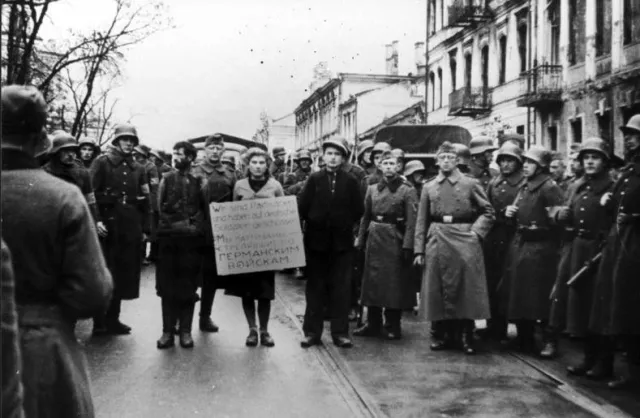[Editor's note: This picture does not belong to Ms. Drapkina’s personal family pictures. Due to the importance to Ms. Drapkina’s life story, we took it from the Bundesarchiv under the creative commons license CC BY-SA 3.0 DE]
This photograph was taken in 1942 in Minsk during the death penalty of partisans. On March 3, 1942 there happened a terrible pogrom, at the warehouse we were told that ghetto was in fire. We asked assistant of the chief, the old man not to carry us in ghetto after work, but he said it was impossible. When we arrived, they made us stand in line at the ghetto entrance. We were surrounded by armed guard, it was impossible to escape. There were several cordons, and near each one a German checked documents. I had a worker's pass. Germans sorted people to groups. It lasted very long, night closed in, it was cold, and full moon gave bright light.
It was already about 3 o'clock in the morning. In the first group they gathered Hamburg Jews (they were holding hands). I approached them and went through, having lifted their hands. I was moving towards ghetto. Poles stood next, and again I went through. I came up a German who checked documents, and he struck me on the head by a whip, but he let me in ghetto, and I joined a group of our men whom we worked together. A person among them asked me about his daughter, but I knew nothing. At last Germans ordered 'Go home!' And the next day all our men arrived at the warehouse, but only 2 girls including me. After that I realized that it was necessary to escape. But how? Earlier we talked about it with Masha Bruskina and assumed that somewhere there was an anti-fascist underground. But on October 26 Masha was hung up by Germans. I'd like to tell you a little about my friend Masha Bruskina.
We made friends with her before the war when we studied in the theatrical studio. During German occupation Masha got fixed up in a job at a hospital situated out of ghetto limits. They did not want Jews to work there. So Masha blonded her hair and managed to get that job. When wounded men recovered, they usually were sent to Germany for forced labor. To avoid it, Masha got somewhere civil clothes for them and helped them to find partisans. But it could not go on without end: someone informed Germans against Masha. Germans arranged a demonstrative execution and hung Masha in one of the Minsk squares. Her body was left on the gibbet for a long time. Having learnt about it, Masha's mother (she was in ghetto together with us) went crazy. After the end of the war I came to Minsk and visited the local museum. There I saw a photo of partisans on the gibbet and recognized Masha Bruskina among them. There was an inscription 'Unknown Partisans.' I immediately recognized Masha and addressed administration of the museum. But they talked to me very scornfully; they said that for some reason several people of a certain appearance wanted to discuss that photograph. They hinted at my nationality. I t took me a lot of time to rehabilitate Masha Bruskina: she died saving lives. It is very hard to recollect it now.























